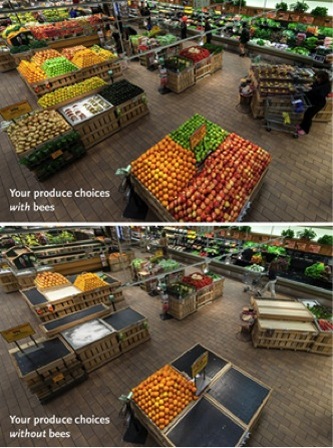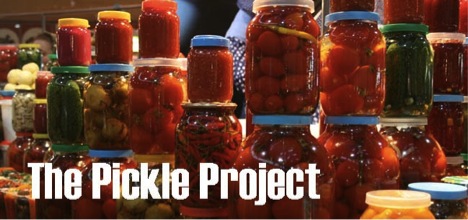This past Friday Bill Moyers did an excellent encore interview with the makers of this new documentary (by the makers of Food Inc.) exploring hunger and malnutrition in America. Check it out: The Faces of America's HungryThey make very clear the connections between poverty, obesity and malnutrition, and a convincing argument for continuing programs like SNAP, and raising wages. For example, they show how many calories of junk food you can get, compared to healthy food, for a small amount of money, and show the same kids who are obese are often malnourished--most of their calories coming from sugar, etc. When one of the moms gets full-time work they are excited that the film will end happily, only to discover that it's just the beginning, getting to a very important point. The woman loses her support from the government, and hunger becomes a real problem for her family. They make the excellent point that this issue comes down to wages, and the real 'welfare queens' are the companies like Walmart who are paying wages so low that the government has to chip in to feed the families of their workers. Bill Moyers asks a great question, along the lines of "whenever reforms are proposed in Washington people come up against the power of big corporations.. What makes you think you can get past this?.." Their answer was hopeful, and I think this is a crucial issue of our unsustainable country/world.
Another hopeful presentation I heard recently was part of the Monadnock Summer Lyceum. It was an excellent and encouraging talk by Gar Alperovitz called Is There an America Beyond Capitalism? He points out the growing trend of ecologically sustainable cooperatives, worker-owned companies and democratic corporations in the U.S. and worldwide, and the "seeds of a new economy are forming." "The time is right for a major new movement—one that is both practical and inspirational. Alperovitz’s new book, What Then Must We Do, is about what it will take to build a new system to replace the decaying one—and how over time to step by step strengthen our communities through cooperatives, worker-owned companies, neighborhood corporations, small and medium-size independent businesses, and publicly owned enterprises."
I recently read an article in Organic Gardening magazine describing a study by two scientists (one of them from NH!) that concludes the active ingredient in Roundup (the herbicide widely used on crops that are genetically modified to withstand it) is connected to many of the "diseases of civilization" " These diseases and conditions include gastrointestinal disorders, obesity, diabetes, heart disease, depression, autism, infertility, cancer, Alzheimer's disease, Parkinson's disease, birth defects, and more." The authors reviews 286 studies on the biological effects of the chemical (glyphosate). So, this is nothing new, but it is raising awareness about this chemical that is very widely used, and our food system is increasingly dependent on. "These findings are a bombshell that, if confirmed by further studies, could lead to a worldwide ban on glyphosate."Check it out: http://www.organicgardening.com/living/roundup-unready -Sam
 by Lise T. Mailloux – Health Educator
Goffstown High School, Goffstown, New Hampshire
Introduction Every organic system, from the microcosmic to the enormous, seeks homeostasis – that refined, systemic balance that sustains life and growth. Every threat to balance is a threat to health and well-being – and when the threat is carried to the extreme, organisms die. Therefore teaching health education, particularly with the teen population, demands both a holistic approach and a sense of urgency. For many years, our curriculum has been rooted in the leading causes of death according to the US Centers for Disease Control. But now it is time to take both studying health holistically as well as the necessary urgency deeper. According to the May 31, 2013 Discover magazine article, “Life, Not Death, is Focus of New Health Metrics”. ( http://discovermagazine.com/2013/julyaug/18-international-health-metric-measures-years-lost) Christopher Murray and the Institute for Health Metrics and Evaluation (IHME) ( http://www.healthmetricsandevaluation.org) emphasize burdens upon health that result in numbers of healthy years of life lost. This elegant model is a two-part theory that computes both what kills people and what burdens their lives with non-fatal health issues. Here “quality of life” is demonstrated in a “footprint of disease” that claims new urgency – and that urgency is claiming the attention and economic distribution of such global giants as the World Health Organization, the Bill and Melinda Gates Foundation, and the United Nations. Weighing these non-fatal burdens on human health and living quickly intertwines with the issues and challenges of food sustainability. Thus I am revising the health education curriculum to introduce students to the ways food sustainability compromises survival and burdens our health and our lives. As I begin this undertaking, I am threading this new statistical model as well as the issues of food sustainability throughout the existing curriculum. I am choosing a particular food sustainability issue to integrate with each major health topic within the curriculum. Each food sustainability issue will drive our exploration of the interrelationships between health, mortality, and the burdens of illness and disease. As I work toward these revisions, I have been studying key, global information; models of utilizing the information; and specific issues that will provide accessible and fascinating approaches in the high school classroom. Key, Global Information Food and Agricultural Organization of the United Nations (FAO) – http://www.fao.org The FAO believes we must all choose diets founded in food sustainability. (Note also that there is a lot of information at this site concerning food labeling, and this is strongly related to Core Curriculum literacy requirements.) World Health Organization – http://www.who.int/en/ 
In our Resources section, which is password protected but you should have access, we now have a scan of key selections from the book No Citizen Left Behind which is part of our preparation for the April Institute. The .pdf file is one of the first items at the top of our Resources page. I took a paragraph from this book and used it in two different ways with two different classes. With my ESL class on comparative culture at SNHU, I had them respond to it in a PowerPoint presentation. With my College Composition class at MCC, I had them respond to it in an essay for their midterm. Here is the midterm with the paragraph I used:
Answer the question: what is a good citizen? In your answer, respond to the following quote:
Can you be a good citizen if you don’t vote? What if you vote, but are uninformed about most of the issues and candidates, or vote solely on the basis of a single issue? How important is it to be law-abiding? Is being economically self-sufficient a hallmark (or even a precondition) of good citizenship? Is never being a burden on others enough to make one a good citizen? How should we judge the act of protesting injustice via civil disobedience against the act of sacrificing oneself on the battlefield for the good of the country?
From No Citizen Left Behind
by Meira Levinson
I got amazing results from both classes!
DURHAM, N.H. – The Sustainability Institute at the University of New Hampshire can now
work with high school teachers and community college faculty in the state and region to design
sustainability curricula for their classrooms with a $50,000 grant from the Verizon Foundation.
Participating schools include Farmington, Salem, and Goffstown high schools; Manchester,
Nashua, and Great Bay community colleges; and New Hampshire Technical Institute.
The Sustainability Learning Collaboratives will link UNH education faculty with community
colleges and high schools with large under-served populations (ethnically and
socioeconomically), engaging them over the course of 2013 in curriculum development and
professional studies. In addition, teachers and faculty will develop new teaching methods and
assessment strategies reflecting the principles of sustainability.
“UNH is a great public university, with a visionary Sustainability Institute,” says Paula Salvio,
professor of education, a faculty fellow at the Sustainability Institute and faculty director of the
project. “Together with our colleagues, we’re looking forward to creating innovative high school
and community college curricula that bring humanities and social science perspectives to
environmental challenges and policymaking.”
Participants will design curricula during three workshops in 2013, the first of which was recently
held at UNH March 1 – 3, 2013. The Sustainability Institute “CORE” model (curriculum,
operations, research and engagement) will be adapted by teachers and faculty to reflect their
respective challenges and opportunities. Two other workshops will be held in late April and in
the summer. The goal is for each participating school to implement the curriculum in next fall.
“To ensure we foster the sustainability thought leaders of tomorrow, we must ensure they can
attain the best education available today,” says James Gowen, chief sustainability officer at
Verizon. “The Sustainability Institute at the University of New Hampshire is helping to inspire,
educate and prepare these students to face today’s sustainability challenges, and transform them
into opportunities for a greener tomorrow.”
Engagement with the state and region on sustainability education is a key component of the
Sustainability Institute at UNH. Sustainability is a core value of UNH, shaping its culture,
informing behavior, and guiding its work. As a nationally recognized leader, UNH draws on the
Sustainability Institute to act as convener, cultivator and champion of sustainability on campus,
in the state and region, and around the world. Learn more at www.sustainableunh.unh.edu.
The University of New Hampshire, founded in 1866, is a world-class public research university
with the feel of a New England liberal arts college. A land, sea and space-grant university, UNH
is the state’s flagship public institution, enrolling 11,800 undergraduate and 2,400 graduate
students.
As you prepare for our next Institute, some of the resources in this segment may prove to be thought-provoking as you consider ways to draw sustainability concepts into your courses.  Source: School Nutrition This 60 page magazine is full of ideas, program spotlights, leader highlights and kid-friendly ideas. Though some of the articles are set at the elementary level, there are certainly ways that ideas can translate across grade levels and communities.
The full text of School Nutrition is available here online. When you go to the page, notice the arrows in the upper center of the screen; these will take you through the document page by page. There are several other neat navigation features to check out - printing, sharing, etc.
Click the image below to be directed to the home page for the NH Farm to School Program. This vast resource provides resources, program examples, lists ways to get involved, and more useful links.

Source: NH Farm to School Program
The excerpt below is from thr National Farm to School Network's own introduction. Of particular interest here may be their leadership model: not prescribing or imposing, but rather connecting and enriching the experience of local programs.

Source: NH Farm to School Network
 This article illustrates what happens when the land dictates the crop and circumstance for someone willing to listen. Reaching out to high school students, this farmer also made his venture a community-building educational opportunity. -Amanda
I wanted to share an opportunity with you all! I look forward to formally meeting everyone during our April Ins
Here is the link for details about this sustainability institute and application:
Hello All: This is a great program that immerses you in studying Gandhi and his impact on the world. I did it about 5 years ago and loved the two weeks in California. All it cost me was the plane ticket, some walk-around money, and tickets to the Hollywood Bowl. It was an 8 credit graduate course!!! I would highlight the following • Residential Fellowship. Successful participants will be awarded fellowships covering the costs of instruction plus room and board for two weeks, books and materials, and the use of Cal Poly Pomona Library. • Course Credit, Professional Development and Career Advancement. The Fellowship award will also cover the cost of 8 units of course credits. These credits may be used toward a Master’s degree and/or salary advancement. Call for Applications Residential Summer Institute Fellowship for K-12 Educators
Gandhi, Sustainability and Happiness Cal Poly Pomona July 29-August 12, 2013 Application Deadline: Monday, April 8, 2013 Download the Program Flyer Ahimsa Center’s 2013 Summer Institute for K-12 teachers—the fifth one in a series on education about nonviolence—will focus on Mohandas K. Gandhi, Sustainability, and Happiness. Gandhi’s enduring significance is anchored in his uncompromising commitment to ahimsa or nonviolence—the experience of oneness with others and nature--as the foundation for his vision of humanity, and for the well-being and happiness of all, which he called sarvodaya. Sustainability refers to the ability to sustain life, while maintaining an ecological balance that is rooted in caring for nature and caring for the needs of generations to come. Happiness endures in a solidly grounded sense of well-being, of flourishing, and of having found meaning and purpose in life. This two-week residential institute will focus on examining the relevance of Gandhi’s thought for the current discourses on sustainability and happiness. This institute will provide a select group of forty K-12 educators an extraordinary opportunity for educational leadership by becoming adept at integrating in school curricula the lessons based on critical understanding of Gandhi’s life and its significance for achieving the goals of sustainability and enduring happiness. For fellowship details, including selection criteria, and application procedure, visit http://www.csupomona.edu/~ahimsacenter/institute/summer_institute_2013.shtml Applications will be accepted through Monday, April 8, 2013 and will be reviewed as they come in. Early application is strongly recommended. For queries or additional information, please feel free to contact [email protected]Tara Sethia, Ph.D. Director, Ahimsa Center Professor of History Cal Poly Pomona Pomona, CA 91768 (909) 869-3868[email protected]http://www.csupomona.edu/~ahimsacenter/ahimsa_home.shtmlAlso, if you're into LEGOS and have a teacher you can partner with, here's a grant that's due NEXT week.... http://www.edublue.org/Item.asp?art=2
Always on the lookout for more resources for my developmental reading courses, I came across this ACT Reading Practice Test that is comprised completely of readings that can tie into sustainability and cultural sustainability discussions. I'll give a direct link to a saved file here, and a weblink to the web page it came from here.
|








 RSS Feed
RSS Feed